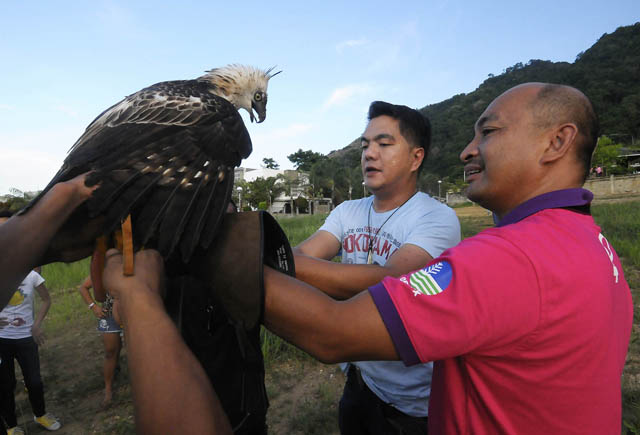CAGAYAN DE ORO CITY (MindaNews/27 May) — The Philippine Hawk Eagle refused to fly at first and preferred to perch on the gloved hands of Roel Dahonog, acting chief of the Protected Areas and Wildlife Division of the Department of Environment and Natural Resources-X, at the slopes of Malasag Hill in the city’s outskirts on Monday.
Prodded on to fly, the raptor flew but landed on the ground a little farther from Dahonog and other bird handlers.
One of the handlers, Dr. Miguel de Leon, stepped gently toward the bird and picked it up with his bare hands.
“This is not good. The bird is becoming tame. It’s a raptor and it should not have allowed anyone to touch it,” de Leon said.
He had to break into a trot with the large bird on his hand before it flew to its freedom toward the nearby trees on the slopes of Malasag Hill.
PAWD-X recovered the Philippine Hawk Eagle from an unauthorized collector in Barangay FS Catanico, this city last May 14.
Weighing only about 1.5 kilos, the raptor had a huge gash from its beak to the back of its head and its handlers had given up the bird for dead.
The DENR gave the bird to de Leon hoping he could save it. De Leon, an ophthalmologist by profession and son of the late Mindanao Herald weekly publisher Cynthia de Leon, is a wildlife enthusiast.
“When I saw the bird, I thought it would not survive. It had deep avulsions for its injuries,” he said.
But the bird recovered after de Leon performed a surgical procedure on it.
The DENR and de Leon scheduled an early release date for the bird to prevent it from getting domesticated. Last Monday, the bird was released back to the wild at the slopes of Malasag Hill.
“Philippine Hawk Eagles are birds of prey. It hunts for its food. It will get lazy and will lose its hunting skills if we continuously feed it,” de Leon explained.
According to the wildlife monitoring group Birdlife International, there are only 320 to 340 pairs of Philippine Hawk Eagle in Mindanao and some 220 pairs in Luzon.
The group classified the Philippine Hawk Eagle as “vulnerable” due to loss of its forest habitation, hunting and trade.
Dahonog said the DENR has to resort to asking help from people like de Leon because it lacks the expertise and personnel.
 Dahonog said a Philippine Eagle Owl nicknamed “Chico” they have given to de Leon was found to have lost its hunting skills.
Dahonog said a Philippine Eagle Owl nicknamed “Chico” they have given to de Leon was found to have lost its hunting skills.
He is asking for any kind residents to adopt the bird and like de Leon, the DENR would issue them with Certificates of Wildlife Registration allowing them to keep the owl.
There are at least 100 individuals issued with the certificates in Region 10 and each of them is allowed to acquire wildlife so long as its origin is legal.
Dahonog said they are strictly monitoring the collectors because the trade of wildlife is a booming market despite DENR efforts to get rid of it since 10 years ago.
“The attraction of having an exotic pet is fueling a multi-billion peso illegal trade of wildlife in the country. It is ongoing despite our efforts to stop it ten years ago,” he said.
On May 16, a raid conducted by the Philippine National Police Criminal Detection and Investigation Group on a suspected gunrunner’s house yielded, aside from firearms, several wildlife species in cages including a crocodile.
Dahonog said the internal traffickers of wildlife still use the old port of entry in General Santos City to smuggle turtles, geckos, snakes, turtles and mynahs from Indonesia which are placed in cramped boxes.
He said because the DENR lacks the personnel to monitor the illegal trade, the smugglers could easily bring the wildlife species to Manila by trucks via the Lipata ferry in Surigao City.
He said another preferred route used by wildlife smugglers is via Palawan and most of the animals end up for sale on the streets of Cebu City.
“But the major market for the illegal wildlife sale is Cartimar Market in Pasay City. You can find every species of wildlife for sale in Cartimar,” Dahonog said.
The sale of wildlife in Cartimar Market is also advertised openly in social networks and blog sites.
In one blog site, allthingsmanila.blogspot.com , a picture of an 11-month macaw for sale for P75,000 was posted.
Dahonog said the sale of exotic wildlife is not only in Cartimar Market. It is also rampantly advertised in other websites.
Philippine Congress passed Republic Act no. 9147 or the Wildlife Resources Conservation Act to protect the country’s wildlife from illicit trade, abuse and destruction.
The law also regulates the collection and trade of wildlife and spurs conservation efforts in its habitats.
(Froilan Gallardo/MindaNews)
